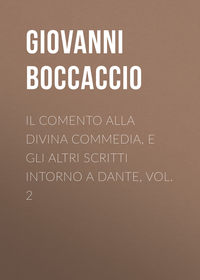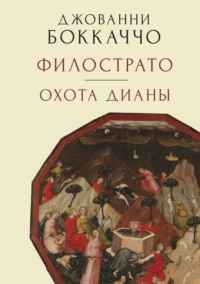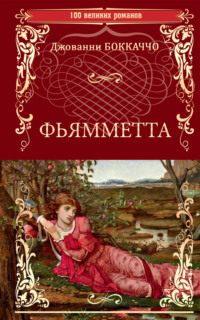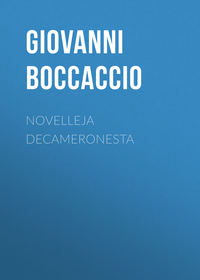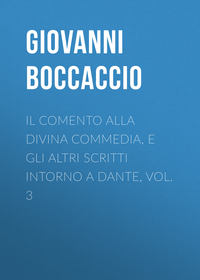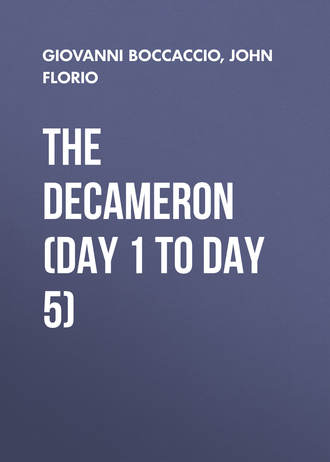 полная версия
полная версияThe Decameron (Day 1 to Day 5)
After a little curbing in of his wrath, somewhat in a milder strain, thus he proceeded. Because the Gentlewomans husband is journeyed to Geneway, proves this a ladder to your hope, that to embrace her in your armes, you must climbe over the Garden wall, like a treacherous robber in the night season, mount up a tree before her Chamber window, open the Casement, as hoping to compasse that by importunity, which her spotlesse chastity will never permit. There is nothing in the world, that possibly she can hate more then you, and yet you will love her whether she will or no. Many demonstrations her selfe hath made to you, how retrograde you are to any good conceit of her, & my loving admonishments might have had better successe in you, then as yet they shewe by outward apparance. But one thing I must tell you, her silent sufferance of your injuries all this while, hath not bin in any respect of you, but at my earnest entreaties, and for my sake. But now shee will be patient no longer, and I have given her free license, if ever heereafter you offer to attempt her any more, to make her complaint before her Brethren, which will redound to your no meane danger.
The Gentleman, having wisely collected his Love-lesson out of the Holy Fathers angry words, pacified the good old man so wel as he could with very solemne promises and protestations, that he should heare (no more) any misbehaviour of his. And being gone from him, followed the instructions given in her complaint, by climbing over the Garden Wall, ascending the Tree, and entering at the Casement, standing ready open to welcome him. Thus the Friers simplicity, wrought on by her most ingenuous subtiltie, made way to obtaine both their longing desires.
A yong Scholler, named Felice, enstructed Puccio di Rinieri, how to become rich in a very short time. While Puccio made experience of the instructions taught him; Felice obtained the favour of his DaughterThe fourth Novell
Wherein is declared, what craft and subtilty some wily wits can devise, to deceive the simple, and compasse their owne desiresAfter that Philomena had finished her Tale, she sate still; and Dioneus with faire and pleasing Language, commended the Gentlewomans quaint cunning, but smiled at the Confessors witlesse simplicity. Then the Queen, turning with chearefull looks towards Pamphilus, commaunded him to continue on their delight; who gladly yeelded, and thus began. Madame, many men there are, who while they strive to climbe from a good estate, to a seeming better; doe become in much worse condition then they were before. As happened to a neighbour of ours, and no long time since, as the accident will better acquaint you withall.
According as I have heard it reported, neere to Saint Brancazio, there dwelt an honest man, and some-what rich, who was called Puccio di Rinieri, and who addicted all his paines and endeavours to Alchimy: wherefore, he kept no other family, but onely a widdowed daughter, and a servant; and because he had no other Art or exercise, hee used often to frequent the market place. And in regard he was but a weake witted man, and a gourmand or grosse feeder; his language was the more harsh and rude, like to our common Porters or loutish men, and his carriage also absurd, boore-like, and clownish. His daughter, being named Monna Isabetta, aged not above eight and twenty, or thirty yeers; was a fresh indifferent faire, plumpe, round woman, cherry cheekt, like a Queene-Apple; and, to please her Father, fed not so sparingly, as otherwise she wold have done, but when she communed or jested with any body, she would talke of nothing, but onely concerning the great vertue in Alchimy, extolling it above all other Arts.
Much about this season of the yeare, there returned a young Scholler from Paris, named Felice, faire of complexion, comely of person, ingeniously witted, and skilfully learned, who (soone after) grew into familiarity with Puccio: now because he could resolve him in many doubts, depending on his profession of Alchimy, (himselfe having onely practise, but no great learning) he used many questions to him, shewed him very especiall matters of secrecy, entertaining him often to dinners and suppers, whensoever he pleased to come and converse with him; and his daughter likewise, perceiving with what favour her Father respected him, became the more familiar with him, allowing him good regard and reverence.
The young man continuing his resort to the House of Puccio, and observing the widow to be faire, fresh, and prettily formall; he began to consider with himselfe, what those things might be, wherein shee was most wanting; and (if he could) to save anothers labour, supply them by his best endeavours. Thus not alwayes carrying his eyes before him, but using many backe and circumspect regards, he proceeded so farre in his wylie apprehensions, that (by a few sparkes close kept together) he kindled part of the same fire in her, which began to flame apparantly in him. And he very wittily observing the same, as occasion first smiled on him, and allowed him favourable opportunity, so did hee impart his intention to her.
Now albeit he found her plyant enough, to gaine physick for her owne griefe, as soone as his; yet the meanes and manner were (as yet) quite out of all apprehension. For shee in no other part of the World, would trust her selfe in the young mans company, but onely in her Fathers house; and that was a place out of all possibility, because Puccio (by a long continued custome) used to watch well neere all the night, as commonly he did, each night after other, never stirring foorth of the roomes, which much abated the edge of the young mans appetite. After infinite intricate revolvings, wheeling about his busied braine, he thought it not altogether an Herculian taske, to enjoy his happinesse in the house, and without any suspition, albeit Puccio kept still within doores, and watched as hee was wont to doe.
Upon a day as he sate in familiar conference with Puccio, he began to speake unto him in this manner; I have many times noted, kinde friend Puccio, that all thy desire and endeavour is, by what meanes thou mayest become very rich, wherein (me thinkes) thou takest too wide a course, when there is a much neere and shorter way, which Mighell, Scotus, and other his associates, very diligently observed and followed, yet were never willing to instruct other men therein; whereby the misterie might be drowned in oblivion, and prosecuted by none but onely great Lords, that are able to undergoe it. But because thou art mine especiall friend, and I have received from thee infinite kind favours; whereas I never intended, that any man (by me) should be acquainted with so rare a secret; if thou wilt imitate the course as I shall shew thee, I purpose to teach it thee in full perfection. Puccio being very earnestly desirous to understand the speediest way to so singular a mysterie, first began to entreat him (with no meane instance) to acquaint him with the rules of so rich a Science; and afterward sware unto him, never to disclose it to any person, except hee gave his consent thereto; affirming beside, that it was a rarity, not easie to be comprehended by very apprehensive judgements. Well (quoth Felice) seeing thou hast made me such a sound and solemne promise, I will make it knowne unto thee.
Know then friend Puccio, the Philosophers do hold, that such as covet to become rich indeed, must understand how to make the Stone: as I will tell thee how, but marke the manner very heedfully. I do not say, that after the Stone is obtained, thou shalt be even as rich as now thou art; but thou shalt plainly perceive, that the very grosest substance, which hitherto thou hast seene, all of them shal be made pure golde, and such as afterward thou makest, shall be more certaine, then to go or come with Aqua fortis, as now they do. Most expedient is it therefore, that when a man will go diligently about this businesse, and purposeth to prosecute such a singular labour, which will and must continue for the space of 40 nights, he must give very carefull attendance, wholly abstaining from sleepe, slumbering, or so much as nodding all that while.
Moreover, in some apt and convenient place of thy house, there must be a forge or furnace erected, framed in decent and formall fashion, and neere it a large table placed, ordered in such sort, as standing upright on thy feete, and leaning the reines of thy backe against it; thou must stande stedfastly in that manner every night, without the least motion or stirring, untill the breake of day appeareth, and thine eyes still uppon the Furnace fixed, to keepe ever in memory, the true order which I have prescribed. So soone as the morning is seene, thou mayst (if thou wilt) walke, or rest a little upon thy bed, and afterward go about thy businesse, if thou have any. Then go to dinner, attending readily till the evenings approach, preparing such things as I will readily set thee downe in writing, without which there is not any thing to bee done; and then returne to the same taske againe, not varying a jot from the course directed. Before the time be fully expired, thou shalt perceive many apparant signes, that the stone is still in absolute forwardnesse, but it will bee utterly lost if thou fayle in the least of all the observances. And when the experience hath crowned thy labour, thou art sure to have the Philosophers stone, and thereby shalt be able to enrich all, and worke wonders beside.
Puccio instantly replied. Now trust me Sir, there is no great difficultie in this labour; neither doth it require any extraordinary length of time: but it may very easily be followed and performed, and (by your friendly favour, in helping to direct the Furnace and Table, according as you imagine most convenient) on Sunday at night next, I will begin my task. The Scholler being gone, he went to his daughter, and tolde her all the matter, and what he had determined to do: which shee immediately understood sufficiently, and what would ensue on his nightly watching in that manner, returning him answer, that whatsoever he liked and allowed of, it became not her any way to mislike. Thus they continued in this kinde concordance, till Sunday night came. When Puccio was to begin his experience, and Felice to set forward upon his adventure. Concluded it was, that every night the Scholler must come to Supper, partly to bee a witnesse of his constant performance, but more especially for his owne advantage.
The place which Puccio had chosen, for his hopefull attaining to the Philosophers Stone, was close to the Chamber where his daughter lay, having no other separation or division, but an old ruinous tottring wall. So that, when the Scholler was playing his prize, Puccio heard an unwonted noise in the house, which he had never observed before, neither knew the wall to have any such motion: wherefore, not daring to stirre from his standing, least all should be marrd in the very beginning, he called to his daughter, demanding, what busie labour she was about? The widdow, being much addicted to frumping, according as questions were demanded of her, and (perhaps) forgetting who spake to her, pleasantly replied: Whoop Sir, where are we now? Are the Spirits of Alchimy walking in the house, that we cannot lye quietly in our beds?
Puccio mervailing at this answer, knowing she never gave him the like before; demanded againe, what she did? The subtle wench, remembring that she had not answered as became her, said: Pardon mee Father, my wits were not mine owne, when you demanded such a sodaine question; and I have heard you say an hundred times, that when folke go supperles to bed, either they walke in their sleepe, or being awake, talke very idely, as (no doubt) you have discernde by me. Nay daughter (quoth he) it may be, that I was in a waking dreame, and thought I heard the olde wall totter: but I see I was deceived, for now it is quiet and still enough. Talke no more good Father, saide she, least you stirre from your place, and hinder your labour: take no care for mee, I am able enough to have care of my selfe.
To prevent any more of these nightly disturbances, they went to lodge in another part of the house, where they continued out the time of Puccioes paines, with equall contentment to them both, which made her divers times say to Felice: You teach my father the cheefe grounds of Alchimy, while we helpe to waste away his treasure. Thus the Scholler being but poore, yet well forwarded in Learning, made use of Puccioes folly, and found benefit thereby, to keepe him out of wants, which is the bane and overthrow of numberlesse good wits. And Puccio dying, before the date of his limitted time, because hee failed of the Philosophers Stone, Isabetta joyned in marriage with Felice, to make him amends for enstructing her father, by which meanes he came to be her husband.
Ricciardo, surnamed the Magnifico, gave a Horse to Signior Francesco Vergellisi, upon condition, that (by his leave and lisence) he might speake to his Wife in his presence; which he did, and shee not returning him any answere, made answer to himselfe on her behalfe, and according to his answer, so the effect followedThe fifth Novell
Wherein is described the frailety of some Women, and folly of such Husbands, as leave them alone to their owne dispositionPamphilus having ended the Novell of Puccio the Alchimist, the Queene fixing her eye on Madam Eliza, gave order, that shee should succeede with hers next. When shee looking somewhat more austerely, then any of the rest, not in any spleen, but as it was her usuall manner, thus began. The World containeth some particular people who doe beleeve (because themselves know something) that others are ignorant in all things; who for the most part, while they intend to make a scorne of other men, upon the proofe, doe finde themselves to carry away the scorne. And therefore I account it no meane follie in them, who (upon no occasion) will tempt the power of another mans wit or experience. But because all men and women (perhaps) are not of mine opinion; I meane that you shall perceive it more apparantly, by an accident happening to a Knight of Pistoia, as you shall heare by me related.
In the Towne of Pistoia, bordering upon Florence, there lived not long since, a Knight named Signior Francesco; descended of the linage or family of the Vergellisi, a man very rich, wise, and in many things provident, but gripple, covetous, and too close handed, without respect to his worth and reputation. He being called to the Office of Podesta in the City of Millaine, furnished himselfe with all things (in honourable manner) beseeming such a charge; only, a comely horse (for his owne saddle) excepted, which he knew not by any meanes how to compasse, so loath he was to lay out money, albeit his credit much depended thereon.
At the same time, there lived in Pistoya likewise, a young man, named Ricciardo, derived of meane birth, but very wealthy, quicke witted, and of commendable person, alwayes going so neate, fine, and formall in his apparrell, that he was generally tearmed the Magnifico, who had long time affected, yea, and closely courted, (though without any advantage or successe) the Lady and Wife of Signior Francesco, who was very beautifull, vertuous, and chaste. It so chanced, that this Magnifico had the very choysest and goodliest ambling Gelding in all Tuscanie, which he loved dearely, for his faire forme, and other good parts. Upon a flying rumor throughout Pistoria, that he daily made love to the fore-said Lady: some busie body, put it into the head of Signior Francesco, that if he pleased to request the Gelding, the Magnifico would frankly give it him, in regard of the love he bare to his Wife.
The base minded Knight, coveting to have the Horse, and yet not to part with any money, sent for the Magnifico, desiring to buy his faire Gelding of him, because he hoped to have him of free gift. The Magnifico hearing his request, was not a little joyfull hereof, and thus answered; Sir, if you would give me all the wealth which you possesse in this World, I will not sell you my Horse, rather I will bestow him on you as a Gentlemanly gift; but yet upon this condition, that before you have him delivered, I may with your lisence, and in your presence speake a few words to your vertuous Ladie, and so farre off in distance from you, as I may not be heard by any, but onely her selfe. Signior Francesco, wholly conducted by his base avaricious desire, and meaning to make a scorne at the Magnifico, made answere; that he was well contented, to let him speake with her when he would, and leaving him in the great Hall of the house, he went to his Wives Chamber, and told her, how easily he might enjoy the Horse; commanding her forth-with, to come and heare what he could say to her, onely shee should abstaine, and not returne him any answer. The Lady with a modest blush, much condemned this folly in him, that his covetousnesse should serve as a cloake, to cover any unfitting speeches, which her chaste eares could never endure to heare: neverthelesse, being to obey her Husbands will, shee promised to doe it, and followed him downe into the House, to heare what the Magnifico would say. Againe, he there confirmed the bargaine made with her Husband, and sitting downe by her in a corner of the Hall, farre enough off from any ones hearing, taking her curteously by the hand, thus he spake.
Worthy Lady, it appeareth to me for a certainty, that you are so truly wise, as you have (no doubt) a long while since perceived, what unfained affection your beauty (farre excelling all other womens that I know) hath compelled me to beare you. Setting aside those commendable qualities, and singular vertues, gloriously shining in you, and powerfull enough to make a conquest of the very stoutest courage: I held it utterly needlesse, to let you understand by words, how faithfull the love is I beare you, were it not much more fervent and constant, then ever any other man can expresse to a woman. In which condition it shall still continue, without the least blemish or impaire, so long as I enjoy life or motion; yea, and I dare assure you, that if in the future World, affection may containe the same powerfull dominion, as it doth in this; I am the man, borne to love you perpetually. Whereby you may rest confidently perswaded, that you enjoy not any thing, how poore or precious soever it be, which you can so solemnely account to be your owne, and in the truest title of right, as you may my selfe, in all that I have, or for ever shall be mine.
To confirme your opinion in this case, by any argument of greater power, let me tell you, that I should repute it as my fairest and most gracious fortune, if you would command me some such service, as consisteth in mine ability to performe, and in your courteous favour to accept, yea, if it were to travaile thorow the whole world, right willing am I, and obedient. In which regard, faire Madame, if I be so much yours, as you heare I am, I may boldly adventure (and not without good reason) to acquaint your chaste eares with my earnest desires, for on you onely dependeth my happinesse, life and absolute comfort, and as your most humble servant, I beseech you (my dearest good, and sole hope of my soule) that rigour may dwell no longer in your gentle brest, but Lady-like pitty and compassion: whereby I shal say, that as your divine beauty enflamed mine affections, even so it extended such a mercifull qualification, as exceeded all my hope, but not the halfe part of your pitty.
Admit (miracle of Ladies) that I should die in this distresse: Alas, my death would be but your dishonour; I cannot be termed mine owne murtherer, when the Dart came from your eye that did it, and must remaine a witnesse of your rigour. You cannot then chuse but call to minde, and say within your owne soule: Alas! what a sinne have I committed, in being so unmercifull to my Magnifico. Repentance then serves to no purpose, but you must answere for such unkinde cruelty. Wherefore, to prevent so blacke a scandall to your bright beauty, beside the ceaselesse acclamations, which will dogge your walkes in the day time, and breake your quiet sleepes in the night season, with fearefull sights and gastly apparitions, hovering and haunting about your bed; let all these move you to milde mercy, and spill not life, when you may save it.
So the Magnifico ceasing, with teares streaming from his eyes, and sighes breaking from his heart, he sate still in exspectation of the Ladies answere, who made neither long or short of the matter, neither Tilts not Tourneying, nor many lost mornings and evenings, nor infinite other such like offices, which the Magnifico (for her sake) from time to time had spent in vaine, without the least shew of acceptation, or any hope at all to winne her love: Moved now in this very houre, by these solemne protestations, or rather most prevailing asseverations; she began to finde that in her, which (before) she never felt, namely Love. And although (to keepe her promise made to her husband) shee spake not a word: yet her heart heaving, her soule throbbing, sighes intermixing, and complexion altering, could not hide her intended answere to the Magnifico, if promise had beene no hinderance to her will. All this while the Magnifico sate as mute as she, and seeing she would not give him any answere at all; he could not chuse but wonder thereat, yet at length perceived, that it was thus cunningly contrived by her husband. Notwithstanding, observing well her countenance, that it was in a quite contrary temper, another kinde of fire sparkling in her eye, other humours flowing, her pulses strongly beating, her stomack rising, and sighes swelling; all these were arguments of a change, and motives to advance his hope. Taking courage by this tickling perswasion, and instructing his minde with a new kinde of counsell: he would needes answere himselfe on her behalfe, and as if she had uttered the words, he spake in this manner.
Magnifico, and my friend, surely it is a long time since, when I first noted thine affection towards me, to be very great and most perfect: but now I am much more certaine thereof, by thine owne honest and gentle speeches, which content me as they ought to doe. Neverthelesse, if heretofore I have seemed cruell and unkinde to thee, I would not have thee thinke, that my heart was any way guilty of my outward severity; but did evermore love thee, and held thee dearer then any man living. But yet it became me to doe so, as well in feare of others, as for the renowne of mine owne reputation. But now the time is at hand, to let thee know more clearely, whether I doe affect thee or no: as a just guerdon of thy constant love, which long thou hast, and still doest beare to me. Wherefore comfort thy selfe, and dwell upon this undoubted hope, because Signior Francesco my husband, is to be absent hence for many dayes, being chosen Podesta at Millaine, as thou canst not chuse but heare, for it is common through the Country.
I know (for my sake) thou hast given him thy goodly ambling Gelding, and so soone as hee is gone, I promise thee upon my word, and by the faithfull love I beare thee: that I will have further conference with thee, and let thee understand somewhat more of my minde. And because this is neither fitting time nor place, to discourse on matters of such serious moment; observe heereafter, as a signall, when thou seest my crimson skarfe hanging in the window of my Chamber, which is upon the Garden side; that evening (so soone as it is night) come to the Garden gate, with wary respect, that no eye doe discover thee, and there thou shalt finde me walking, and ready to acquaint thee with other matters, according as I shall finde occasion.
When the Magnifico, in the person of the Lady, had spoken thus, then hee returned her this answere. Most vertuous Lady, my spirits are so transported with extraordinary joy, for this your gracious and welcome answere; that my sences so fayle mee, and all my faculties quite forsake me, as I cannot give you such thankes as I would. And if I could speake equally to my desire, yet the season sutes not therewith, neither were it convenient that I should be so troublesome to you. Let me therefore humbly beseech you, that the desire I have to accomplish your will (which words availe not to expresse) may remaine in your kinde consideration. And, as you have commaunded me, so will I not faile to performe it accordingly, and in more thankfull manner, then as yet I am able to let you know. Now there resteth nothing else to doe, but, under the protection of your gracious pardon, I to give over speech, and you to attend your worthy husband.



